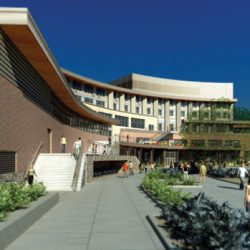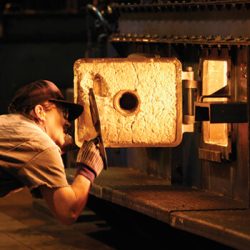What Lies Beneath
New research center digs deep for sustainable energy source.

The Wisconsin Institutes for Discovery, scheduled to open in 2010, rises from the heart of campus on an August night with the state capitol in the background. Photo: Bryce Richter
One of the newest UW-Madison buildings is also one of the greenest on campus.
The Wisconsin Institutes for Discovery — scheduled to open in late 2010 on the 1300 block of University Avenue — will be the first campus research facility to use a geothermal heating-and-cooling system; Olin House, the official residence of UW-Madison’s chancellor, also has a geothermal system.
The energy source, which relies on the constant temperature of the earth (45 to 55 degrees year-round) to regulate building temperature during Madison’s changing seasons, is expected to yield savings of approximately 10 percent a year and provide about 15 percent of the building’s ultimate heating-and-cooling load.
Building the $1.25 million system required drilling seventy-five bore holes, each 300 feet deep into the ground and filled with piping to transfer heat to and from the building. It will capture the ground’s heat instead of burning fossil fuels or using electricity to help keep the 300,000-square-foot building warm in the winter.
In other words, a geothermal system doesn’t make heat — it moves it around. When the weather turns warm, the ground acts as a natural condenser to maintain cool temperatures inside. And it’s a power source that doesn’t vary, unlike wind and solar energy.
Coupled with the building’s mechanical systems, the geothermal system will balance energy usage and increase efficiency by simultaneously cooling large occupied spaces, such as conference rooms, while heating other areas of the building with the excess warmth.
Sustainability was one of the core principles for the building project, which will house the publicly funded Wisconsin Institute for Discovery and the private Morgridge Institute for Research. Both will provide space for scientists doing interdisciplinary research spanning biotechnology, nanotechnology, and information technologies designed to improve human health.
Published in the Winter 2009 issue



Comments
No comments posted yet.